
Building a pan-European Infrastructure for excellent citizen science for the future of citizen science
Franziska Stressmann
June 4, 2025, 8:22 a.m.
With the rapid growth of citizen science since the early 2010s, the citizen science landscape is becoming increasingly complex and diverse. Hundreds of thousands of volunteers now collect and share data on biodiversity, air quality, public health, climate and much more, fueling thousands of research papers and making strides towards informing local, national and international policies. Yet beneath this success lies a patchwork of platforms and data silos, that limit our collective impact.
Citizen science projects are shaped by a wide range of approaches, contexts, and choices. Some initiatives grow organically from grassroots efforts, while others are developed within institutional frameworks and supported by formal research programmes. Projects must also make careful decisions about how they manage data—many embrace open science principles, while others adopt more controlled models to protect privacy, ensure long-term sustainability, or respect data ownership. Within this varied ecosystem, each citizen science initiative must navigate its own path, balancing ambition with practical realities. This includes addressing challenges such as short-term funding, the need for data standardisation and interoperability, ensuring data quality and ethical governance, and building appropriate training and capacity-building mechanisms. These decisions shape not only how citizen science projects operate, but also how they contribute to broader scientific and societal goals.
How can the citizen science community navigate and embrace this complexity for the future? How can we arrive at a harmonised field that has impact (in whatever way we may define it) and yet always has the most important factor – the people – in mind?
Several imperatives are needed for this: 1) We must foster ongoing dialogue among citizens, practitioners, researchers, funders, platform providers and policymakers—building true multi‑stakeholder governance; 2) we must provide adequate and harmonised training and capacity‑building, 3) we must build robust quality assurance frameworks that will ensure that data generated by citizen science meet the standards needed for scientific and policy use.
When these elements come together, citizen science can do far more than collect data. It can bridge the ideal of participatory knowledge production with the realities of complex societal challenges. And it is exactly in this spirit that the RIECS‑Concept project (Towards a Pan‑European Research Infrastructure for Excellent Citizen Science) was born.
RIECS-Concept came to life in November 2023, when the European Commission released the INFRA‑2024‑DEV‑01‑01 call which supports the development of new concepts for research infrastructures of European interest. Fundación Ibercivis (the coordinator of the project) answered by gathering a consortium with 13 partners from Spain, Germany, Austria, Sweden, Italy, Serbia, Lithuania, and Switzerland. The plan was to submit a proposal to design Europe’s, and indeed the world’s, first comprehensive research infrastructure for citizen science. Many in the consortium felt this was „reaching for the stars“ in the highly competitive European landscape of infrastructures. Yet, here we are, 5 months into RIECS-Concept, poised to translate the proposal into a solid concept at the end of 2027.
RIECS-Concept kick-off-meeting in January 2025 in Brussels (photo by: Paulius Šūmakaris, Vilnius Gediminas Technical University)
The mission of RIECS-Concept is to weave together citizens – the core component of the research infrastructure – with the resources they contribute (e.g. mobile phones, computers, community networks) and existing scientific resources such as platforms, repositories and other research infrastructures whilst providing a range of transversal services to the entire citizen science community.
Over the coming two and a half years, RIECS‑Concept will deliver a conceptual design and feasibility study to explore all technical, organisational and operational challenges, propose an inventory of components and services, as well as five‑year implementation plan and a sustainability roadmap—laying out how to sustain and govern this infrastructure well beyond any single funding cycle.
Along the way, we will tackle crucial questions: What governance structures will allow platform users to move effortlessly between disciplines, regions, and data sources? How do we define excellence in citizen science? How do we build bridges to policymakers so that citizen voices shape research agendas and foster evidence-based decision making? How do we integrate AI‑driven analysis while protecting privacy and ethical principles? And how can we recognize the value of volunteer contributions—so that citizens see their efforts reflected not only in research outputs but in professional career paths as well? How do we ensure interoperability and ultimately sustainability with the European Open Science Cloud, as well as the ESFRI Roadmap (the European Strategic Forum for Research Infrastructures) that supports successful infrastructures.
The journey ahead is somewhat daunting, the project will design a concept for a research infrastructure with a planned lifecycle of more than 30 years, yet society and technology are changing so fast it feels on occasion like peering into a crystal ball.
That is why, from day one, we have embraced open governance, a research infrastructure for citizen science needs to be co-designed by the community: around 100 workshops will gather insights, needs and expertise of all users and stakeholders across Europe and beyond.
Having just returned from CAPS, the conference of the Association for Advancing Participatory Sciences in Portland (27-20 May, 2025), where RIECS-Concept hosted a symposium to learn from USA colleagues and platforms, I feel a profound sense of urgency. In an era of rising polarisation, skepticism towards science and even the value of multinational endeavours, the need for strengthening citizen science as a democratic right to participate in knowledge production, and with a robust, broad and institutionalised infrastructure has never been greater.
If you would like to join our co‑creation journey, share your expertise, or help shape RIECS‑Concept in any way, please get in touch (riecs-concept@ecsa.ngo). Together, we will build the infrastructure that citizen science, and Europe, needs—for decades to come.
Franziska Stressmann is project officer at ECSA and scientific coordinator RIECS-Concept
Cover photo: Ferdinand 'Ferre' Feys @flickr